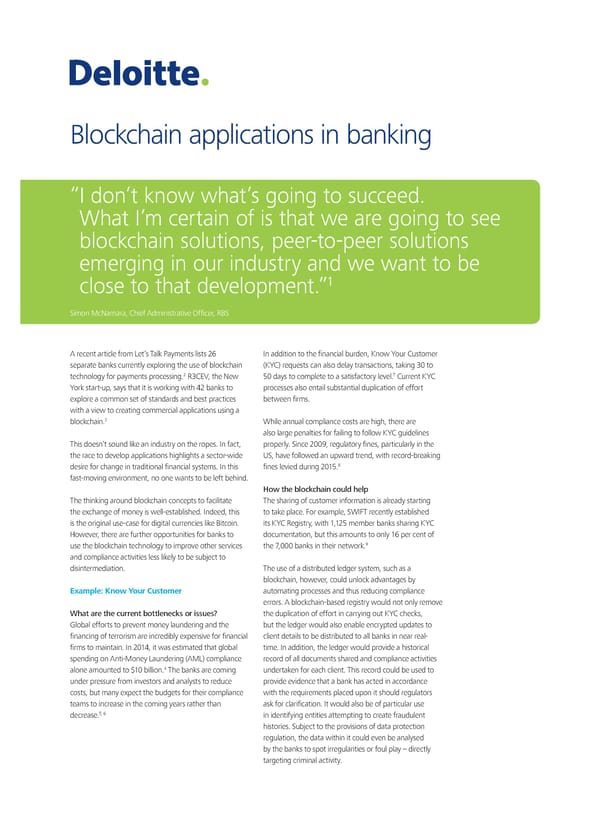Blockchain applications in banking “ I don’t know what’s going to succeed. What I’m certain of is that we are going to see blockchain solutions, peer-to-peer solutions emerging in our industry and we want to be 1 close to that development.” Simon McNamara, Chief Administrative Officer, RBS A recent article from Let’s Talk Payments lists 26 In addition to the financial burden, Know Your Customer separate banks currently exploring the use of blockchain (KYC) requests can also delay transactions, taking 30 to 2 7 technology for payments processing. R3CEV, the New 50 days to complete to a satisfactory level. Current KYC York start-up, says that it is working with 42 banks to processes also entail substantial duplication of effort explore a common set of standards and best practices between firms. with a view to creating commercial applications using a 3 blockchain. While annual compliance costs are high, there are also large penalties for failing to follow KYC guidelines This doesn’t sound like an industry on the ropes. In fact, properly. Since 2009, regulatory fines, particularly in the the race to develop applications highlights a sector-wide US, have followed an upward trend, with record-breaking desire for change in traditional financial systems. In this fines levied during 2015.8 fast-moving environment, no one wants to be left behind. How the blockchain could help The thinking around blockchain concepts to facilitate The sharing of customer information is already starting the exchange of money is well-established. Indeed, this to take place. For example, SWIFT recently established is the original use-case for digital currencies like Bitcoin. its KYC Registry, with 1,125 member banks sharing KYC However, there are further opportunities for banks to documentation, but this amounts to only 16 per cent of 9 use the blockchain technology to improve other services the 7,000 banks in their network. and compliance activities less likely to be subject to disintermediation. The use of a distributed ledger system, such as a blockchain, however, could unlock advantages by Example: Know Your Customer automating processes and thus reducing compliance errors. A blockchain-based registry would not only remove What are the current bottlenecks or issues? the duplication of effort in carrying out KYC checks, Global efforts to prevent money laundering and the but the ledger would also enable encrypted updates to financing of terrorism are incredibly expensive for financial client details to be distributed to all banks in near real- firms to maintain. In 2014, it was estimated that global time. In addition, the ledger would provide a historical spending on Anti-Money Laundering (AML) compliance record of all documents shared and compliance activities 4 alone amounted to $10 billion. The banks are coming undertaken for each client. This record could be used to under pressure from investors and analysts to reduce provide evidence that a bank has acted in accordance costs, but many expect the budgets for their compliance with the requirements placed upon it should regulators teams to increase in the coming years rather than ask for clarification. It would also be of particular use decrease.5, 6 in identifying entities attempting to create fraudulent histories. Subject to the provisions of data protection regulation, the data within it could even be analysed by the banks to spot irregularities or foul play – directly targeting criminal activity. J3975_BlockchainInsert.indd 1 15/01/2016 17:00
 Blockchains: Enigma. Paradox. Opportunity. Page 19 Page 21
Blockchains: Enigma. Paradox. Opportunity. Page 19 Page 21